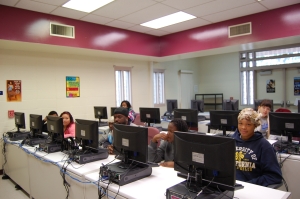MSW Students Take On Community Research Project
April 25, 2012 / by Maya Meinert- Research
When MSW student Ingrid Estrada saw the panic on the woman’s face when she thought she had missed her chance at qualifying for a computer, Estrada knew the project had struck a chord.
This woman, a resident of the Jordan Downs public housing complex in the Watts neighborhood of South Los Angeles, had rushed into the community center, still dripping from the pouring rain outside, to take a survey that would eventually put a free computer in her home. Near tears, she explained how she needed the computer for her children’s education and to look for jobs.
“The residents know [having a computer] will bring added value to their quality of life,” Estrada said. “It was very humbling to see that reaction from that woman.”
Estrada is one of 12 USC School of Social Work students working with the Los Angeles Opportunities Industrialization Center to evaluate its Computers for Families program, which puts computers and Internet access in homes and provides computer literacy training to Jordan Downs residents, about 200 of whom have or will receive computers. The MSW students are part of an independent-study course led by Vice Dean R. Paul Maiden and Clinical Assistant Professor Juan Araque that gives students a hands-on experience with macro-level social work, or changing larger systems, such as communities and organizations.
Araque said the essence of the assignment was to examine the relationship Jordan Downs residents had to their environment, which proved to be an effective way to get the students involved in local initiatives while doing a good deed.
Over the course of a semester, the class focused on the relationship between the use of computer technology and the improvement of a family’s socio-economic and educational situations. Students conducted literature reviews, survey design, on-site focus groups – in English and Spanish – and data analysis, with a final report presented to the board of directors of LAOIC, which launched Computers for Families in 2010.
“USC gave clarity to what we were doing. I knew we were making a difference, but I didn’t know how to measure it,” said Chris Floyd, executive director of LAOIC. “Computer illiteracy prohibited us from placing people in jobs, and kids couldn’t complete their homework. This program is just the beginning of exposing what technology really means to a low-income family.”
From a review of studies on the issue of the “digital divide,” students found that the divide is shifting from differences in access to the Internet to differences in the regularity of Internet use, which has led to a lack of literacy and digital skills.
The students found this new digital divide reflected in some of the survey responses. While program participants were significantly more likely to report using a computer for more than one hour a day, and to report filling out and submitting a job application online, a large percentage of both participants and those interested in participating reported not using the computer at all to find jobs. However, a majority of all people surveyed expressed a desire to learn computer and Internet skills, knowing that doing so would help them find better employment and their children perform better in school. The MSW students’ final report recommends continued and enhanced training to help get Jordan Downs residents more up to speed.
Student KaSandre Kirby said the study’s findings dispel any idea that people with low incomes don’t want to find ways to improve their situations.
“They all expressed an eagerness to learn more,” she said. “They want to make themselves more knowledgeable and provide that opportunity for their kids, too.”
Maiden pointed out that older adults are also benefitting from the Computers for Families program.
“Without technology, the world is so narrow. With it, your whole world opens up,” he said. “It’s stimulating for them, and it’s important for overall behavioral health.”
After doing this hands-on research project, which included learning how to use geographic information system software to map key asset and risk factors and computer hardware distribution throughout the apartment complex, the students said they have a newfound appreciation for the work social work researchers do.
“The hypothetical research project is very different from doing a real research project,” Estrada said. “The collaboration process has been eye-opening. This project has given context to all the research papers we’ve done and makes research more attainable. I won’t shy away from it now.”
Some students have already put what they’ve learned to use in their field placements. Norma Bravo is using her knowledge of survey question development and focus group research in a community-based literacy program. Araceli Vasquez said the Jordan Downs experience has helped her feel more comfortable doing statistical analysis and survey evaluations, which has, in turn, helped her prepare reports at the Los Angeles Unified School District.
Maiden said his goal in teaming up with a social services organization such as LAOIC is to provide real-life research opportunities for students, and he hopes to create more partnerships like this in the future.
Cherry Short, assistant dean for global and community initiatives at the School of Social Work and chair of the Family First advisory committee at Jordan Downs, also recognized the importance of the computer program to the community.
“The Computers for Families project has definitely changed people’s lives,” she said. “There’s a focus on giving them a sense of purpose.”
To reference the work of our faculty online, we ask that you directly quote their work where possible and attribute it to "FACULTY NAME, a professor in the USC Suzanne Dworak-Peck School of Social Work” (LINK: https://dworakpeck.usc.edu)
